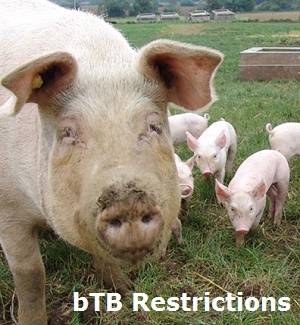BOVINE TB IN PIGS: Most of the pig industry has rejected the new proposals for bringing in tougher bovine TB regulations.
The aim is to bring pigs and other non-bovines into line with those already in place for cattle.
The National Pig Association submitted a six-page response to the Defra consultation.
The NPA is the leading voice representing the pig industry in the United Kingdom.
They argue that TB breakdowns have already created a disproportionate impact on pig farming. Often, the cost far outweighs the risk of bTB disease spreading around the country.
Bovine Tuberculosis Regulation Proposals
The new bTB proposals include:
- Making it a duty to report suspicion of bTB in non-bovines.
- Bringing in further rules around testing.
- Treating disease and vaccination into line with cattle.
- New government powers to require the isolation of specific animals.
- Prohibiting the movement of animals on to or off of premises (except under licence).
There also introduced a motion to bring in new TB compensation rates for non-bovines. The suggestion is to pay half of the estimated market values.
The concern is that some of proposed changes by Defra would only add to the burden for pig farmers. The pig industry sees little improvements in reducing actual disease risk.
Response by the National Pig Association
We completely accept that developing coherent transparent regulations is important. We will aid greater compliance. But, we disagree with your view that none of the proposed changes will impose significant new burdens on the pig sector.
It appears some of the suggested changes to make life simpler for the regulator has little thought for the likely financial impact on the industry.
The proposal of extra controls appear to be at odds with the low risk the pig herd poses to the spread and maintenance of bTB. This is despite continually referring to pigs (quite rightly) as spill-over hosts.
Is there a Realistic Solution?
One example cited was that of an NPA member. He has been under TB restriction since a cull sow got confirmed with bTB in May 2014.
 Around 60,000 pigs have gone through to slaughter from the restricted herd with no bTB disclosed or suspected since then. Yet that particular farm remains under restriction with no clear exit strategy.
Around 60,000 pigs have gone through to slaughter from the restricted herd with no bTB disclosed or suspected since then. Yet that particular farm remains under restriction with no clear exit strategy.
Those TB restrictions cost the business £300,000 in transportation costs alone. This was partly because they needed to divert the pigs to an alternative abattoir.
Following examples like this, NPA urges Defra to work hard to find a realistic solution to the problems facing affected herds.
They went on to say: “Being under restriction for a minimum of two years cannot be a sensible outcome for a very low risk sector.”
The NPA also criticised the Defra proposal to use the John Nix handbook for calculating compensation. They want an alternative system of compensation for pigs slaughtered because of bTB.
The John Nix Farm Management Pocketbook is a trusted handbook in the industry. But, they hope for future compensation values which are more accurate and fairer.
Health Implications of Bovine TB in Pigs?
Pigs are actually classed as a spill-over host. High levels of bTB circulating in wildlife and cattle can spill over into other species.
This includes the pig population even though it is not usually infected with bTB.
Notable situations are more likely to occur in bTB hot spots around the UK. These include the South West and the Midlands but all producers should be vigilant. Off-site and contract growing and finishing increases the risk of disease spread. As does moving pigs between different regions for finishing.
How Do Pigs Get bTB?
- The most likely route for Bovine Tuberculosis is from infected badger urine or mucus. It contaminates farrowing beds which can infect newborn piglets when they inhale into the bed or suckle.
- Contamination also occurs in home mill and mix units using grain from their store (or others) infected by badgers.
- From direct contact with other infected animals such as deer, wild boar, and cattle.
ALSO IN THIS SECTION
Articles about Workplace and Benefits: Headline stories and workplace news articles from A to Z.
Poultry Slaughter Rules: BVA concerns on the new welfare rules for killing poultry in England.
Pig Meat Inspection Rules: Inspectors must adhere to new regulations beginning in June 2014.
Running a Farming Business: How farms need to comply with various regulations across Britain.
Transporting Livestock Regulations: Key rules and regulations for transporting animals by road.

